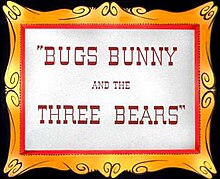Bugs Bunny and the Three Bears
| Bugs Bunny and the Three Bears | |
|---|---|
 | |
| Directed by | Charles M. Jones |
| Story by | Tedd Pierce |
| Produced by | Leon Schlesinger |
| Starring | Mel Blanc Bea Benaderet Kent Rogers |
| Music by | Carl W. Stalling |
| Animation by | Robert Cannon Ken Harris Ben Washam James Culhane Phil DeLara |
| Backgrounds by | Gene Fleury |
| Color process | Technicolor |
Production company | |
| Distributed by | Warner Bros. |
Release date |
|
Running time | 7:22 |
| Language | English |
Bugs Bunny and the Three Bears is a 1944 Merrie Melodies cartoon short directed by Chuck Jones and written by Tedd Pierce.[1] The short was released on February 26, 1944, and features Bugs Bunny.[2] This short marks the first appearance of Jones' dysfunctional version of The Three Bears, and is a parody of the old fairy tale, Goldilocks and The Three Bears.
Plot
[edit]Three Bears, afflicted by hunger pangs, devise a scheme to entice Goldilocks using carrot soup as bait due to their depleted porridge supply. Subsequently, they orchestrate a feigned departure, only to lurk within their domicile, anticipating Goldilocks's arrival. The savory aroma emanating from the simmering soup captivates Bugs Bunny, leading him into the Bears' abode, unwittingly assuming the role of the traditional trespasser in the Goldilocks and the Three Bears fable.
Bugs partakes of the Bears' culinary offering, prompting their attempted assault thwarted by Bugs's near detection. Following a brief respite, Bugs reclines in Junior's bed, precipitating the Bears' enactment of the Goldilocks tale culminating in a futile pursuit as Bugs eludes capture. Mama Bear, stirred by Bugs's flattery, momentarily suspends aggression, succumbing to infatuation and pursuing amorous overtures.
In his endeavor to evade Mama Bear's advances, Bugs traverses various chambers, encountering Mama Bear in progressively alluring guises, only to find himself ensnared in his own rabbit hole. Mama Bear, seizing the opportunity, indulges in affectionate exchanges with Bugs, culminating in a flurry of unseen embraces. Bugs emerges disheveled, bearing evidence of their encounter, and flees into the distance screaming, leaving Mama Bear adorned with crimson lipstick, basking in the afterglow of their liaison.
Cast
[edit]- Mel Blanc as Bugs Bunny / Papa Bear
- Bea Benaderet as Mama Bear (uncredited)
- Kent Rogers as Junior Bear (uncredited)
Production notes
[edit]Mel Blanc provides the voices of Bugs and Papa Bear (for the latter using a raucous voice similar to Yosemite Sam only a little higher-pitched). Mama Bear is voiced by Bea Benaderet, while Kent Rogers voiced dim-witted Junior. The cartoon was released four months before Rogers' death in a crash during a training flight in Pensacola, Florida, while he was in the United States Navy during World War II; Stan Freberg would replace Rogers in future installments in the series.
Home media
[edit]- VHS - Cartoon Moviestars: Bugs!
- Laserdisc - Cartoon Moviestars: Bugs! and Elmer!
- VHS - Bugs Bunny Collection: Bugs Bunny's Greatest Hits
- Laserdisc - The Golden Age of Looney Tunes: Vol. 3, Side 2: Bugs Bunny
- DVD - Looney Tunes Golden Collection: Volume 1, Disc Three
- DVD - Looney Tunes: Spotlight Collection, Disc One
Sources
[edit]- Sandler, Kevin S. (1998), "Notes to Pages 162-165", in Sandler, Kevin S. (ed.), Reading the Rabbit: Explorations in Warner Bros. Animation, Rutgers University Press, ISBN 978-0813525389
See also
[edit]References
[edit]- ^ Beck, Jerry; Friedwald, Will (1989). Looney Tunes and Merrie Melodies: A Complete Illustrated Guide to the Warner Bros. Cartoons. Henry Holt and Co. p. 148. ISBN 0-8050-0894-2.
- ^ Lenburg, Jeff (1999). The Encyclopedia of Animated Cartoons. Checkmark Books. pp. 60-61. ISBN 0-8160-3831-7. Retrieved 6 June 2020.
External links
[edit]- 1944 films
- Merrie Melodies short films
- Warner Bros. Cartoons animated short films
- American parody films
- Fairy tale parody films
- Short films directed by Chuck Jones
- Animated films based on Goldilocks and the Three Bears
- Animated films about bears
- Animated films about rabbits and hares
- Films scored by Carl Stalling
- Films produced by Leon Schlesinger
- Bugs Bunny films
- 1940s Warner Bros. animated short films
- 1944 animated short films
